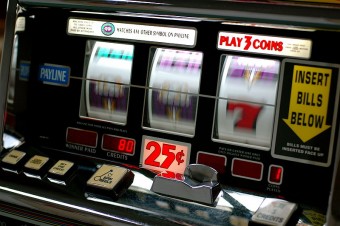Where the Term “Jackpot” Came From
 Today I found out the origin of the term “jackpot”.
Today I found out the origin of the term “jackpot”.
Jackpot originally popped up around the 1870s and was from the poker game “Jacks or Better”. This is much like traditional five card draw, except in this case, if a player does not have a pair of “jacks or better” in the first round of betting, he has to pass. This doesn’t necessarily mean he has to be holding a pair of jacks, queens, or the like. It just means that he has to be holding cards that will beat a pair of tens.
Once the first person who has that has placed a bet in the opening betting round, the rest of the participants are free to bet as they will, regardless of the cards they hold. In the case where nobody holds “jacks or better”, the hand must be re-dealt with additional ante required, so the pot can grow just from antes.
When the game is finally over, no player is allowed to win with anything less than three of a kind or better. If, at the end, no one has better than three of a kind or more, then no player gets the pot and the hand is re-dealt with additional ante required to be added to the existing accumulated pot. Over time this pot can potentially grow quite large, hence “jackpot”.
Within a few decades of the term “jackpot” in poker popping up, the term morphed into a slang term for “trouble with the law”, and further morphed by the mid-20th century to primarily be associated with “hitting the jackpot” with slot machines. From there, it became even more figurative, referring to any big prize or good turn of events.
If you liked this article, you might also enjoy our new popular podcast, The BrainFood Show (iTunes, Spotify, Google Play Music, Feed), as well as:
- The Origin of the Word “Tip” as in “Leaving a Tip”
- Why Women are Sometimes Called “Chicks”, “Broads”, “Sluts”, and “Dames”
- How Poker Got Its Name
- The Origin and Meanings of 9 Pirate Words and Expressions
- The Origin of “Say Cheese” and When People Started Smiling in Photographs
Bonus Facts:
- Ante comes from the Latin “ante”, meaning “before”, which in turn came from the Proto-Indo-European “*anti”, meaning “facing opposite, before, or in front of”.
- Actor Jimmy Stewart, who incidentally was a two star General in the U.S. Military , once starred in one of his more obscure movies called “Jackpot”. The movie was based on a true story of a man, James P. Caffrey, who won $24,000 (about $210,000 today) worth of random and sometimes bizarre merchandise (on August 28, 1948). In the movie itself, Stewart’s character wins such a prize from a radio contest, the same as the real life Caffrey. Unfortunately, there’s no cash involved yet the character is of course obligated to pay a lot of money in taxes, approximately $7000 that he doesn’t have (his annual salary being just $4500, or about $41,000 today). He then sets about trying to sell the merchandise, but loses his job over it; then later gets arrested as the police think he’s fencing stolen goods.
- “Operation Jackpot” was a U.S. crackdown on marijuana smugglers in the 1980s. Over 3 years of work was spent by this very expensive task force to try to catch about 100 such smugglers, including the “gentlemen smugglers” who were college educated smugglers who abhorred violence (but apparently liked marijuana). Unfortunately for those trying to arrest these individuals, they proved quite slippery and many avoided being arrested for some time. In fact, the last such arrest from Operation Jackpot took place just five years ago in 2007.
- Another of the “war on drugs” operations was “Operation Pipe Dreams” in 2003, which was a nationwide United States investigation which targeted business selling drug paraphernalia. In the end, hundreds of businesses and homes were raided nationwide. 55 people were charged with trafficking of illegal drug paraphernalia and eventually fined and generally given home detentions. The estimated cost of the operation was around twelve million dollars or about $220,000 per person charged and about 2,000 officers involved or about 36 officers per charge.
- One of the earliest documented instances of Poker being played was from 1829 by English actor Joseph Crowell. He stated he played the game in New Orleans that year using a deck of 20 cards and four players, each getting five cards, with bets placed after the cards were dealt. In the early days of Poker, it was common to use fewer cards the fewer people were playing. The game is thought to have spread from New Orleans up the Mississippi on river boats where gambling was extremely popular.
- One trick as to when to bluff and when not (to optimize one’s chance of coming out ahead over many hands) is to use a randomizing agent to help you determine whether to bluff or not, such as deriving a randomizing method off of the exact time when the hand is dealt or some mental randomizer using the number of cards of a certain color in your hand or the like. When using these tricks, you should also factor in the general odds of winning the bluff, partially based on how many people are in the game and how much you have to put in vs. how much the pot is worth.
| Share the Knowledge! |
|





